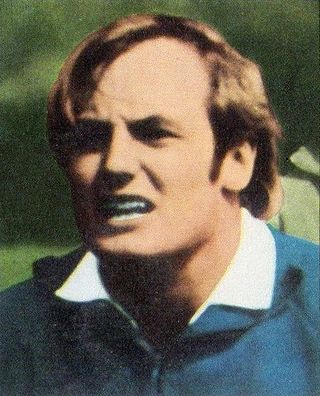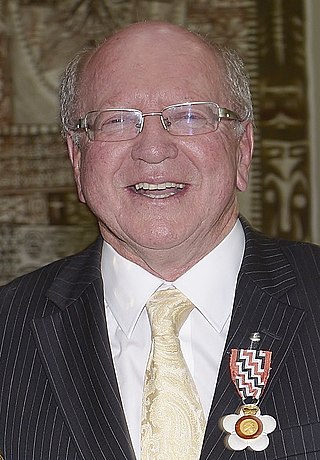
Blenheim Palace is a country house in Woodstock, Oxfordshire, England. It is the seat of the Dukes of Marlborough. Originally called Blenheim Castle, it has been known as Blenheim Palace since the 19th century. One of England's largest houses, it was built between 1705 and 1722, and designated a UNESCO World Heritage Site in 1987.

Sir Peter Wilfred Tapsell was Speaker of the New Zealand House of Representatives from 1993 to 1996. He was notable for being the first Māori Speaker, and for being the first Speaker since Bill Barnard in 1943 to hold office while not a member of the governing party.

David John Duckham MBE was an English rugby union player. He played 36 games for England, in three tests on the 1971 British Lions tour to New Zealand and for Barbarians F.C. in their 1973 defeat of New Zealand.

Jane Gardner Batten, commonly known as Jean Batten, was a New Zealand aviator who made several record-breaking flights – including the first solo flight from England to New Zealand in 1936.

William Lindsay Tisch, known as Lindsay Tisch, is a former New Zealand National Party politician.

Matthew James Hoggard, is a former English cricketer, who played international cricket for England cricket team from 2000 to 2008, playing both Test cricket and One Day Internationals. The 6' 2" Hoggard was a right arm fast-medium bowler and right-handed batsman.

Harold Dennis "Dickie" Bird, is an English former cricketer and retired international cricket umpire. During his long umpiring career, he became a much-loved figure among players and viewing public, due to his excellence as an umpire, but also his many eccentricities.
Pio Keith Terei is a Māori actor, singer and comedian on New Zealand television.
John Bernard Hart is a New Zealand former rugby union personality who coached and managed both the All Blacks and the Auckland rugby union team, and played rugby for Waitemata and Auckland.
Contiki is a global tour company that caters to 18 to 35-year-olds, offering over 350 different tours in over 75 countries in Europe, Australia, New Zealand, North America, South America, Africa, the Middle East, and Asia. It is a subsidiary of The Travel Corporation. Its tours historically had a reputation for partying; however, it also operates wellness trips culturally immersive experiences that focus less on alcohol, which are more popular with Generation Z.

Thomas Lindsay Buick was a Liberal Member of Parliament for Wairau, New Zealand, a journalist and a historian. He published under the name T. Lindsay Buick.

Tiki Taane is a New Zealand musician, experimentalist, musical activist, producer, and live engineer. He was a member of leading New Zealand band Salmonella Dub but left after eleven years on 1 January 2007 to pursue a solo career. His debut album, Past, Present, Future, was released on 22 October 2007 in New Zealand and has since gone two times platinum, achieving a number one single, "Always on My Mind", which became the first digital single to reach platinum sales and also held the record by staying in the NZ Top 40 Charts for 55 weeks. Taane is also the exclusive live sound engineer for New Zealand drum and bass act Shapeshifter since their first gig in 1999. Taane has also produced multi platinum albums for bands such as Six60, Shapeshifter, Salmonella Dub and Tiki Taane.

Arthur Penrose Seymour was a 19th-century New Zealand politician from Picton. He was the 4th Superintendent of the Marlborough Province and was a member of the provincial government for all 16 years of its existence. With his strong advocacy for Picton, he successfully had the Seat of Government moved to Picton. When the Blenheim party secured a majority in the Provincial Council by 1865, Seymour negotiated the removal of the Seat of Government back to Blenheim.
Brent Pope is a New Zealand born rugby television analyst, rugby journalist, charity worker, children's book author, after dinner speaker, founder of Outside in Art Gallery in Dublin, owner of POPE shirts and shoes and founder of The Elephant in the Room, mental Health project. He was born, raised and spent most of his rugby playing career in New Zealand, but has lived and worked in Ireland for most of his coaching, broadcasting, media and business career.
Topdeck Travel is a tour operator providing trips for people aged 18 to 39 throughout Europe, North America, Africa, Egypt, the Middle East, Australia, New Zealand, and Asia. Topdeck offers 330 different tours in 65 countries.

Blenheim Park Railway is a 15 in gauge miniature railway operating in the grounds of Blenheim Palace, in Oxfordshire, England.
Wairau was a parliamentary electorate in the Marlborough Region of New Zealand. It was one of the initial 24 New Zealand electorates and existed from 1853 until its abolition in 1938, when it was succeeded by the Marlborough electorate. The electorate had 13 representatives during its existence. The 1861 election in the Wairau electorate was notable in that a later Premier, Frederick Weld, was unexpectedly and narrowly defeated by William Henry Eyes.
Millicent Amiel Baxter was a New Zealand peace activist and pacifist.
Ellen Margaret Scanlan was a New Zealand journalist and novelist. Her most famous novels were the Pencarrow series of four novels, published between 1932 and 1939.

Australian Pacific Touring (APT) is an Australian tour and river cruising operator with worldwide reach.












